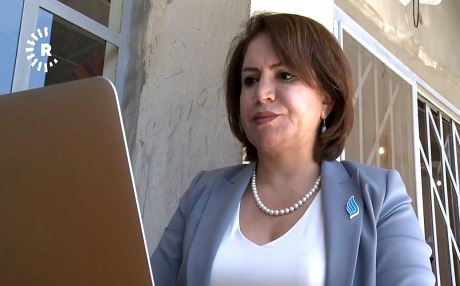Facebook is the most popular social media platform used by millions of people in the Kurdistan Region, a fact noted by political parties and their candidates.
“It is possible to use social media with great benefits, like a main platform for the candidates during election time,” Khanim Rahim, a female candidate for the Coalition of Democracy and Justice (CDJ), told Rudaw in Sulaimani.
“But it also has its side effects. Sometimes it will be used in a very bad way. Or it will be used by other people to name-shame the candidates,” she added.
Khanim Rahim, CDJ candidate for Iraqi election in Suleimani. Photo: Rudaw TV
Election laws have allocated 25 percent of seats in the Iraqi parliament to women.
Dlsoz Zangana, a human rights activist, said the online abuse of candidates is so widespread that the government has to act.
“On Facebook, women candidates are being humiliated. This is not acceptable at all. The authorities themselves should ask to punish such people who make these comments,” she said.
It is a criminal act to use the means of communication such as Facebook for unlawful acts like online abuse. However, many so-called ‘trolls’ use fake accounts, making it difficult for authorities to track them down.
Facebook users also have their concerns. They have been bombarded by a wave of candidate paid ads, videos and posts related to the election, crowding out other areas of interest such as entertainment, one Facebook user said.
“It has been become politics through and through,” he said. “You no longer see any other topic on Facebook except for politics. This has created a bad atmosphere.”
Dr Jwan Ihsan, the top candidate for the Patriotic Union of Kurdistan (PUK) in Sulaimani, was forced earlier this week to issue a statement after a clip of her interview with Rudaw TV went viral on Facebook.
She was accused of ignorance of Iraqi politics after failing to point out during the interview that the Iraqi government no longer has a Ministry of Human Rights, abolished when Prime Minister Haider al-Abadi carried out a set of reforms that reduced the number of the ministries.
She claimed Rudaw had baited her into the exchange to provide fodder for social media.





Comments
Rudaw moderates all comments submitted on our website. We welcome comments which are relevant to the article and encourage further discussion about the issues that matter to you. We also welcome constructive criticism about Rudaw.
To be approved for publication, however, your comments must meet our community guidelines.
We will not tolerate the following: profanity, threats, personal attacks, vulgarity, abuse (such as sexism, racism, homophobia or xenophobia), or commercial or personal promotion.
Comments that do not meet our guidelines will be rejected. Comments are not edited – they are either approved or rejected.
Post a comment